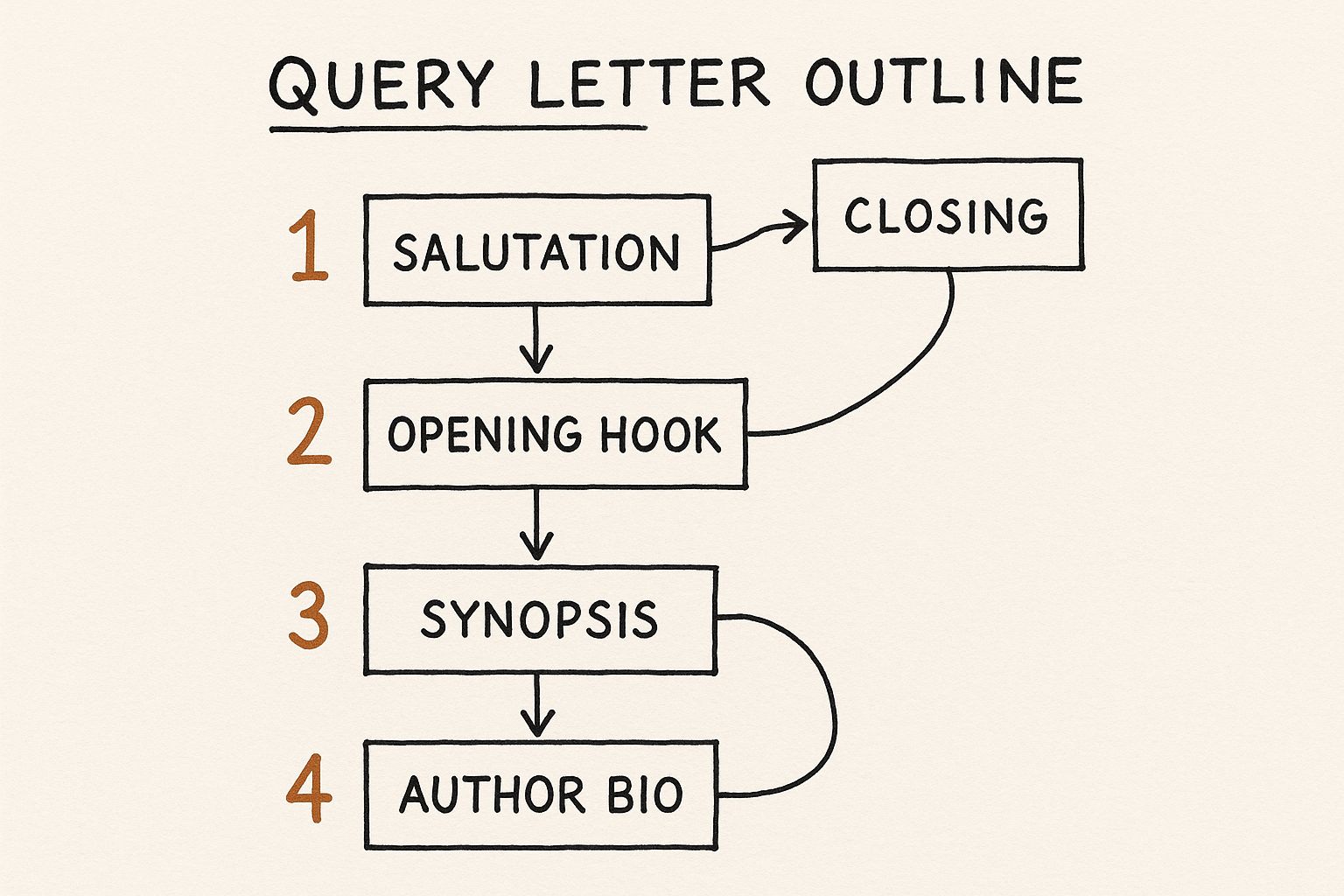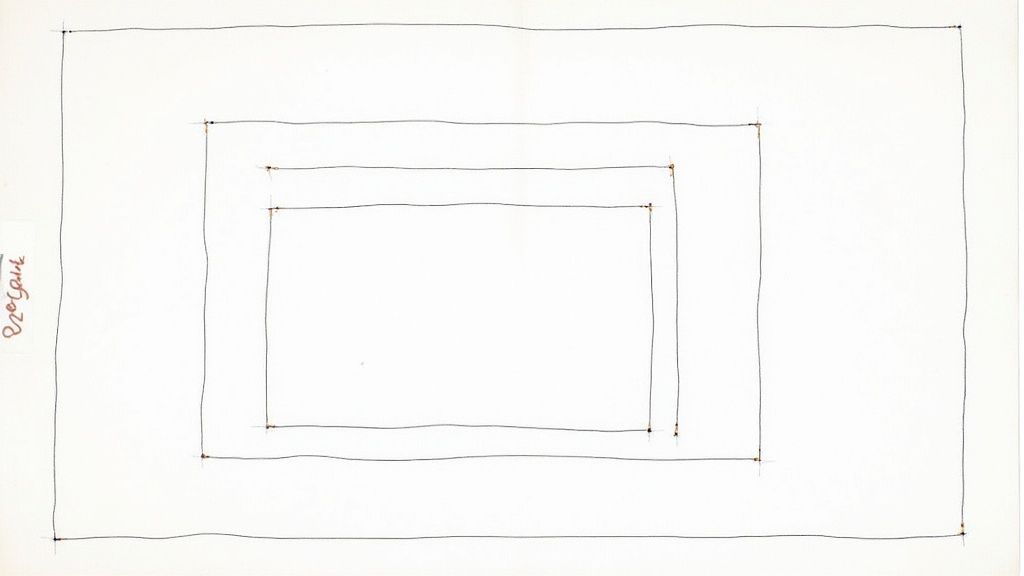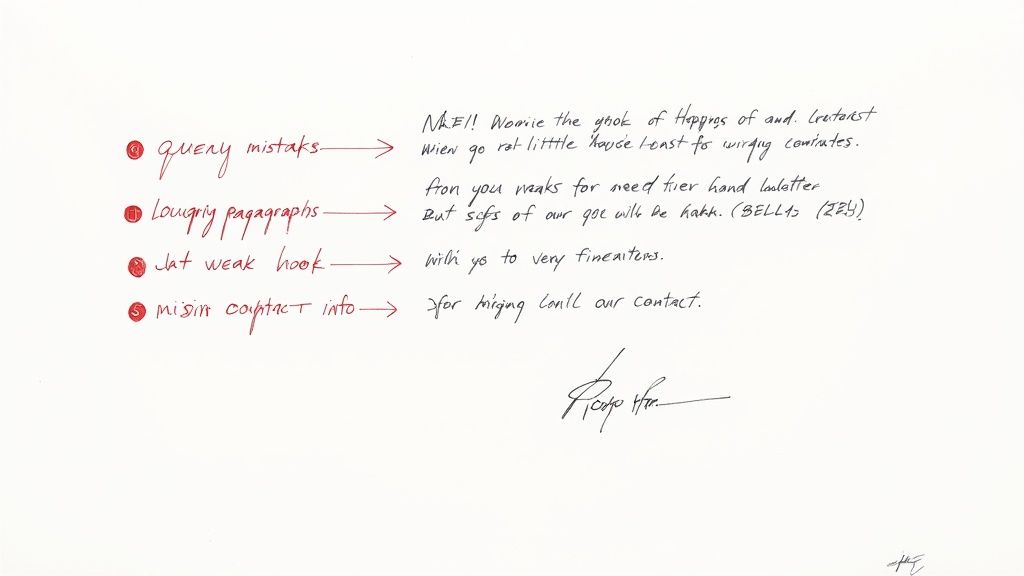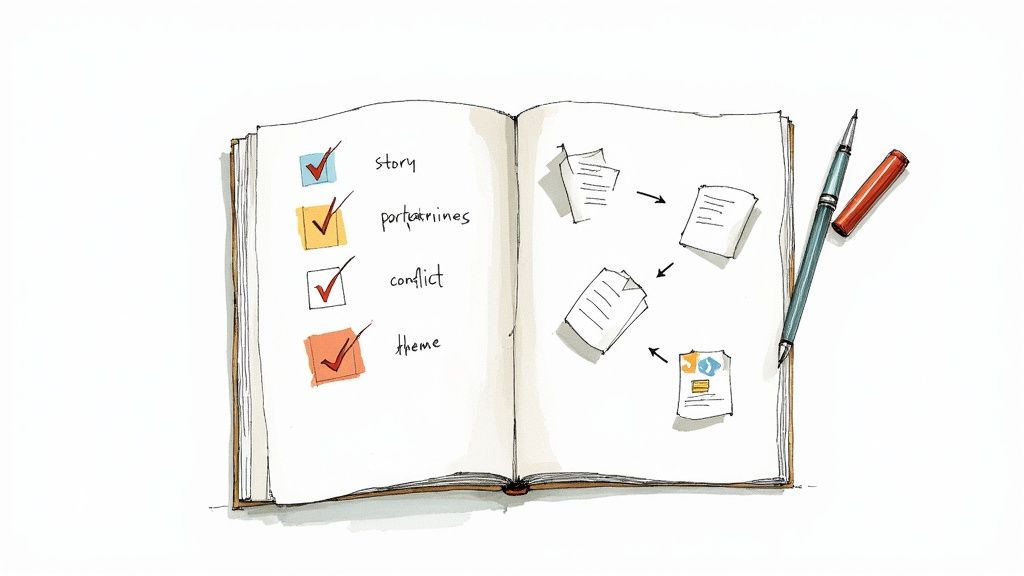A Winning Query Letter Format Sample

Think of your query letter's format as its professional attire. It’s the first thing an agent sees, and it makes an immediate statement about you as a writer. This isn't about rigid, pointless rules; it's about signaling that you're a professional who understands the industry and respects an agent's time.
A query that ignores standard formatting can get tossed aside before the agent even reads your pitch. It’s a harsh reality, but in an inbox overflowing with submissions, agents use shortcuts to filter through the slush pile. Getting the format right is the easiest way to ensure your letter gets a fair look.
The Unspoken Rules of Query Letter Formatting
You wouldn't show up to a high-stakes job interview in flip-flops. In the same way, sending a query letter with a wacky font or messy spacing tells an agent you haven't done your basic research. Your story is where your creativity should shine, not your document layout.
Nail the Formatting Basics
The industry standard is pretty straightforward and universally accepted. Your entire query should fit on a single page, usually landing between 250 and 400 words.
Always use a 12-point font. You can't go wrong with classics like Times New Roman or Arial. The document should be single-spaced, but be sure to add a blank line between each paragraph. This small detail makes a huge difference in readability on a screen. For more in-depth guidance on the entire process, this guide on how to write a query letter is a fantastic resource.
Pro Tip: Your goal with formatting isn't to be unique. It's to be invisible. You want the agent to focus entirely on your compelling pitch, not get distracted by your design choices.
The principles of clean, professional presentation apply to many forms of outreach. Insights from guides on crafting effective email templates can be surprisingly helpful here, as they also emphasize clarity and respect for the recipient's time.
The Quick Formatting Checklist
Before you ever attach your query to an email, run through this quick list:
- Font: 12-point Times New Roman or a similar professional serif font.
- Spacing: Single-spaced text with a double space (one blank line) between paragraphs.
- Length: Keep it to one page (around 250-400 words). Brevity is key.
- Alignment: Standard left-aligned text. Don't justify the margins.
- Contact Info: Place your name, email, and phone number at the very end, after your sign-off.
Essential Query Letter Formatting Checklist
This table is your final checkpoint. Give your query one last look-over to make sure every element is polished and professional before you hit that send button.
| Formatting Element | The Industry Standard | Why It's Important |
|---|---|---|
| Font Type & Size | 12-point Times New Roman, Arial, or Garamond. | Ensures readability and looks professional. Exotic fonts are distracting. |
| Length | One page maximum (250-400 words). | Agents are busy. This length proves you can be concise and respect their time. |
| Spacing | Single-spaced, with a blank line between paragraphs. | Breaks up the text, making it much easier to read on a screen. Avoids the "wall of text." |
| Margins & Alignment | 1-inch margins, left-aligned text. | Creates a clean, standard document layout. Justified text can create awkward spacing. |
| Contact Information | Your name, email, and phone number at the end. | Makes it easy for the agent to contact you without having to hunt for your details. |
Getting these details right takes just a few minutes, but it can make all the difference in a crowded and competitive industry. It’s your first step toward getting that "yes."
Anatomy of a Query Letter That Gets Read
Talking about the rules of query letters is one thing, but seeing them in action is where it all clicks. A great query isn't just a list of facts about your book; it's a strategic sales pitch, carefully crafted to hook an agent from the very first line. Think of it as a story in itself, with each part—the intro, the pitch, the bio, and the closing—leading seamlessly to the next.
Let's pull apart a query letter format sample line by line. I'll show you the thinking behind each sentence so you can see how a powerful query builds momentum and leaves an agent eager to read more.
This visual guide breaks down how the essential pieces fit together.

Subscribe & Get Your Free Marketing Plan Template
Receive regular updates on marketing best-practices, AI shortcuts, and get our proven 4-phase marketing roadmap for free.
Unsubscribe anytime.
As you can see, a query follows a logical path, from a custom greeting all the way to a clean sign-off. Every single element has a job to do.
The Personalization and Hook
Your first few lines are the most critical real estate you have. This is your one shot to grab an agent's attention. If you fumble here, they're already moving on.
Dear [Agent's Full Name],
I am seeking representation for my 80,000-word YA thriller, GHOSTS OF HILLWOOD, which combines the whip-smart amateur sleuthing of Holly Jackson’s A Good Girl’s Guide to Murder with the atmospheric tension of I Killed Zoe Spanos. I saw on your manuscript wish list that you are actively seeking twisty thrillers with complex female protagonists, and I believe my novel will be a perfect fit for your list.
This opening is effective because it’s all business, in a good way. It gets right to the point with the genre, word count, and title. Then, it offers sharp, relevant comparative titles (comps) that show the author understands the market.
Crucially, it proves the author did their homework by mentioning the agent's specific wishlist. This one sentence instantly separates the query from the hundreds of generic, copy-pasted emails an agent receives every week.
The Pitch and The Stakes
Alright, this is the main event. Your mission here is to distill your novel's core conflict, introduce your hero, and clarify the stakes—all without spoiling the ending. You need to make us care.
Seventeen-year-old Iris Blackthorn trusts no one, least of all the police who failed to find her sister a year ago. She now runs a shadow detective agency, tracking cheating boyfriends for pocket money. But when her ex-girlfriend Heather—host of a notorious podcast about Iris's sister—vanishes, Iris is pulled into a case that’s dangerously personal.
With her eighteenth birthday looming, Iris has one month to solve the case before she can be charged as an adult for interfering with an official investigation. As she digs deeper, she uncovers a conspiracy that suggests Heather didn’t just disappear; she was silenced. Now, Iris must decide whether to risk her own freedom to find justice for Heather, or abandon the case before the town’s darkest secrets bury her, too.
This pitch works beautifully. We get a compelling protagonist (Iris), a clear objective (find Heather), and seriously high stakes (both legal and physical danger). It's a tight, focused summary that creates immediate tension.
The Author Bio and Closing
Keep your bio short and sweet. Its only job is to add a touch of credibility and personality. Then, a polite, professional closing is all you need to wrap things up.
I am a full-time student and a life-long reader of mystery and thriller novels.
Thank you for your time and consideration.
Sincerely,
[Your Name]
[Email]
[Phone Number]
Crafting a Pitch That Sells Your Story

Let's be honest: the pitch is where your query letter lives or dies. It’s your one shot, your make-or-break moment to convince an agent that your manuscript is the one they have to read next. This isn't a long, rambling summary. Think of it as a meticulously crafted hook, designed in just a few powerful paragraphs to make them desperate for more.
The whole point is to introduce the heart of your story with style and precision. You need to show the agent your protagonist, what they desperately want, the massive conflict standing in their way, and the terrible things that will happen if they fail. And you have to do all of that without spoiling the ending.
The story description itself should land somewhere between 150 and 300 words. In that tight space, you’re not just hitting plot points; you're weaving them into a compelling narrative that hints at where your book fits on the shelf. This is your chance to show you understand the market.
Building Your Pitch Brick by Brick
Your pitch is the movie trailer for your book. You need to establish the world, introduce a character we can root for, set up the core problem, and hint at the incredible journey to come. A great pitch generates immediate tension and gets the agent emotionally invested from the first sentence.
So, what are the non-negotiable elements?
- The Protagonist: Who is the story about? Give us a feel for their personality and current situation in a single, sharp sentence.
- The Inciting Incident: What's the event that shatters their world and forces them to take action?
- The Core Conflict & Stakes: What do they want more than anything? What’s stopping them? And what are the dire consequences if they don’t succeed?
Key Takeaway: The goal of the pitch isn't to tell the whole story. It’s to ask a compelling question that can only be answered by reading the manuscript. You're teasing the plot just enough to create irresistible intrigue.
The Power of Comparative Titles
In the publishing world, comparative titles (or "comps") are your secret weapon. They’re a kind of industry shorthand that helps an agent instantly place your book in the market. Choosing good comps is a strategic move, not just a list of your favorite novels.
You'll want to pick two recent titles that connect to your manuscript in a meaningful way. One might reflect your book's fast-paced plot or unique voice, while the other could speak to its themes or atmospheric setting. A classic example would be: "My book has the dark academic setting of Ninth House mixed with the high-stakes heist plot of Six of Crows." See? The agent immediately gets a picture of what you're selling.
Perfecting your pitch is closely tied to another crucial document: the synopsis. To get a handle on that longer-form summary, you can find great advice in our guide on how to write a synopsis for book. Nail the pitch, and you're one step closer to getting that coveted request for more material.
Crafting a Bio That Builds Confidence and Credibility

The author bio is the last part of your query letter, and it’s your chance to make a final, confident impression. So many writers get hung up here, worrying they don’t have anything "important" enough to include, especially if they’re just starting out.
Relax. Your bio isn't about listing a dozen prestigious awards. It’s about convincing the agent that you are the perfect person to have written this particular book. Think of it as a quick, professional handshake that connects you, the writer, to the manuscript they just read about. Keep it short and sweet—aim for under 100 words.
A great author bio doesn't need a long list of publications. It just needs to answer one question for the agent: "Why are you the right one to tell this story?"
Link Your Life to Your Manuscript
The strongest bios I've seen always draw a clear, compelling line from the author's real-life experience to the book's subject matter. It gives your story an immediate shot of authenticity that agents absolutely love. You don't need a fancy MFA for this.
For instance, if you’ve written a tense medical thriller, mentioning that you spent a decade as an ER nurse instantly builds trust. If your book is a sweeping historical set in ancient Rome, pointing out your Classics degree or that you spent a summer working on an archeological dig in Italy shows your dedication.
Here's a great example for a debut thriller:
- Debut Author Bio (Thriller): "I am a lifelong reader of mystery novels and a former 911 dispatcher, where I learned that the most frightening calls are often the quietest ones. This is my debut novel."
This bio is fantastic. It connects a real-world job directly to the book's genre, making the author sound like a natural authority on creating tension and suspense. It’s simple, effective, and memorable.
Showcasing Your Writing Credentials and Personality
But what if your day job has nothing to do with your book? No problem. You can still craft a bio that makes you sound like a serious, capable writer. Focus on credentials that show your commitment to writing or your expertise in a related area.
Think about including things like:
- Relevant Memberships: Are you part of a writing organization? Mentioning groups like the Science Fiction & Fantasy Writers of America (SFWA) or Romance Writers of America (RWA) shows you're serious about your craft.
- Minor Awards or Contests: Even being a finalist in a reputable writing contest is worth including. It shows your work has already been vetted by someone.
- A Touch of Personality: Don’t be afraid to add a little something that makes you human. Ending with a brief, charming detail can make you stick in an agent's mind. Something like, "When not writing, I'm attempting to bake the perfect sourdough loaf."
This approach paints a picture of a dedicated, interesting person who is serious about their work—and that’s exactly the kind of author an agent wants to represent.
7 Common Query Letter Mistakes That Guarantee a "No"
Literary agents are absolutely buried in submissions. We’re talking hundreds of queries a week, sometimes even a day. When you’ve waded through thousands of these, you start to see the same mistakes over and over—and they’re almost always the fastest ticket to the rejection pile.
The great news? Most of these blunders are incredibly easy to avoid. Just knowing what not to do will put you head and shoulders above the competition and show an agent you’re a professional who respects their time.
The Generic, Impersonal Pitch
This is, without a doubt, the number one mistake writers make. An agent can spot a generic, copy-pasted email from a mile away, and it’s an immediate red flag. Never, ever use a salutation like "Dear Agent" or "To Whom It May Concern." You have to use their name.
It’s just as bad to be vague about why you chose them. A line like, "I see you represent thrillers" is weak and tells the agent you did the bare minimum. Instead, get specific. Try something like, "I'm querying you because I loved your enthusiasm for [Author's Name]'s debut, and my manuscript shares a similar atmospheric tension with their novel, [Book Title]." Now that shows you’ve actually done your homework.
A personalized query isn't just about stroking an agent's ego. It’s a business pitch. It proves you see them as a strategic partner, not just another name on a spreadsheet.
Another surefire way to make an agent’s eyes roll is to lean on tired clichés. Phrases like "this is the next bestseller," "a story unlike any other," or "my friends and family loved it" are rookie moves. Let the strength of your pitch do the talking.
Confidence comes from a killer concept and clean prose, not empty hype. A strong query letter format sample will never include these amateurish claims.
Frequently Asked Questions About Querying
Once you've polished your query letter, a whole new batch of "what ifs" can pop up. Actually sending the thing out into the world can feel just as nerve-wracking as writing it. Let's dig into some of the most common questions and sticking points writers face when they hit the querying trenches.
One of the biggest worries? Attachments. Should you go ahead and attach your synopsis or the first chapter just in case? The answer is a hard no. Don't send anything the agent hasn't specifically asked for in their submission guidelines. Sending unsolicited attachments is a rookie mistake and can get your email deleted before it's even opened. Let your query do its job: earning the request for more.
Handling Specific Scenarios
So, what do you do if your book is a genre-bending masterpiece that doesn't fit neatly into one category? This is a super common problem. The best strategy is to identify the single, most dominant genre and lead with that.
You can absolutely mention the crossover appeal in the pitch itself. For instance, you might write, "My novel is an 80,000-word adult sci-fi that blends in strong elements of cosmic horror." This gives the agent a clear, marketable category to latch onto while also hinting at a wider audience.
Key Insight: Querying is definitely a numbers game, but it's also a game of professional etiquette. Following an agent's submission guidelines isn't just about jumping through hoops—it shows you've done your homework and respect their time and process.
Then there's the dreaded radio silence. What's the protocol when you've sent your query and hear nothing but crickets?
- Double-Check the Guidelines: Before you do anything, go back and read the agent’s guidelines one more time. Many will tell you their estimated response time or state that if you don't hear from them, it's a pass.
- Be Patient: If they do give a timeline for nudging, respect it. The standard industry wait time is usually around 8-12 weeks. Don't jump the gun.
- Nudge Gently: When it's appropriate to follow up, keep it short and sweet. A polite, professional email is all you need. There's no need to re-pitch your entire book; just a gentle reminder of your original submission is perfect.
Finally, let's talk about a major querying blunder: sending your query to multiple agents at the same literary agency at the same time. Don't do it. Most agencies have a strict policy against this and often share submissions internally anyway. Pick the one agent at the agency who feels like the absolute best fit for your manuscript. If that agent passes, their guidelines might specify whether you can then submit to one of their colleagues.
For more in-depth answers to these kinds of nitty-gritty questions, head over to our comprehensive querying FAQ page.
Stop wrestling with marketing and get back to writing. ManuscriptReport.com delivers a complete, launch-ready marketing report for your book—including blurbs, keywords, ad copy, and social media posts—in about 10 minutes. Get your full-stack book marketing report today.
Enjoyed this article? Subscribe for more + get a free marketing roadmap template.
Receive regular updates on marketing best-practices, AI shortcuts, and get our proven 4-phase marketing roadmap template for free.
Unsubscribe anytime.
Related Articles

8 Book Description Examples: Proven Formulas That Sell in 2026
Master 8 proven book description formulas with real examples. Learn Hook-Question-Stakes, Character-Journey-Transformation, and more techniques that convert browsers to buyers.

How to Outline a Book A Writer's Guide
Learn how to outline a book with our guide. Discover practical methods for brainstorming, structuring, and refining your plot for a better manuscript.

How to Write a Novel Summary: A Step-by-Step Guide
Learn how to write a novel summary that captivates readers. Discover expert tips on crafting compelling summaries that sell your story.